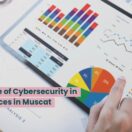In today’s digitized world, financial audits extend far beyond traditional number-crunching. The intersection of cybersecurity and financial audits represents a critical juncture where finance meets technology, a realm fraught with both unprecedented opportunities and formidable challenges. For audit companies in Oman, this convergence necessitates an intricate understanding of how cybersecurity can affect financial data integrity and overall audit outcomes.
Financial auditors must now wear dual hats, becoming adept at fiscal scrutiny and technological vigilance. The core of this intersection lies in ensuring that economic data remains untainted by cyber threats. This means validating financial statements and assessing the security protocols that protect this sensitive information. As cyber threats grow in sophistication, the need for robust cybersecurity measures within financial audits has never been more pressing.
Identifying Cybersecurity Risks in Financial Audits
The identification of cybersecurity risks during financial audits is a pivotal task. In the realm of audit companies in Oman, these risks can manifest in various forms, from phishing attacks aimed at siphoning off confidential financial data to sophisticated malware that can corrupt entire financial databases. Auditors must remain vigilant, employing advanced threat detection techniques to unearth vulnerabilities that could compromise financial integrity.
One prevalent risk is data breaches, where unauthorized access to financial records can lead to significant financial loss and reputational damage. Additionally, ransomware attacks pose a severe threat, where malicious entities lock valuable financial data, demanding a ransom for its release. Such scenarios underscore the importance of incorporating comprehensive cybersecurity assessments within the audit process.
To effectively identify these risks, auditors should employ a combination of traditional audit techniques and modern cybersecurity tools. Penetration testing, vulnerability assessments, and continuous monitoring are essential components of this risk identification framework. By adopting a proactive approach, auditors can pinpoint potential weaknesses before they are exploited by cybercriminals.
Integrating Cybersecurity Measures into Audit Processes
Integrating cybersecurity measures into the audit process is not merely an added layer of security but a fundamental shift in audit methodology. For audit companies in Oman, this integration begins with the establishment of a robust cybersecurity framework that aligns with the overall audit strategy. This framework should encompass policies, procedures, and technologies designed to safeguard financial data throughout the audit lifecycle.
One crucial aspect of this integration is the collaboration between financial auditors and cybersecurity experts. By fostering a multidisciplinary approach, audit firms can leverage specialized knowledge to enhance the security of economic data. This collaboration ensures that all potential cyber threats are identified and mitigated, thus fortifying the audit process against digital incursions.
Moreover, the adoption of advanced cybersecurity technologies, such as artificial intelligence and machine learning, can significantly enhance the audit process. These technologies can automate the detection of anomalies, streamline data analysis, and provide real-time insights into potential cyber threats. By embedding such technologies into their operations, audit companies in Oman can enhance the accuracy and efficiency of their financial audits while ensuring robust cybersecurity.
The Future of Cybersecurity in Financial Audits
The future of cybersecurity in financial audits is poised to evolve rapidly, driven by continuous advancements in technology and the ever-increasing sophistication of cyber threats. For Audit companies in Oman, staying ahead of these trends is essential to maintaining the integrity and reliability of financial audits.
Emerging technologies such as blockchain and quantum computing are set to revolutionize cybersecurity in financial audits. Blockchain, with its immutable ledger, offers unparalleled security for financial transactions, making it invaluable for auditors. Quantum computing, on the other hand, promises to enhance encryption methods, providing a more robust defence against cyber threats.
In addition to technological advancements, regulatory frameworks will play a crucial role in shaping the future of cybersecurity in financial audits. As governments and regulatory bodies tighten cybersecurity requirements, audit companies must stay abreast of these changes to ensure compliance and protect their client’s economic data.
Furthermore, the ongoing development of cybersecurity talent will be vital. As the demand for skilled cybersecurity professionals grows, audit firms must invest in continuous training and development to equip their teams with the necessary expertise to tackle emerging cyber threats.
In conclusion, integrating cybersecurity considerations into financial audits is no longer optional but a necessity for audit companies in Oman. By understanding the intersection of these fields, identifying potential risks, integrating robust cybersecurity measures, and staying ahead of future trends, auditors can safeguard financial integrity and foster trust in their audit outcomes. This proactive approach will not only enhance the security of financial audits but also reinforce the reputation of audit companies in Oman as trusted custodians of financial data.











